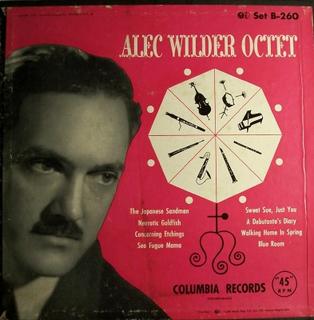Raymond Scott, Part 7: Alec Wilder, again

"Then there was Alec Wilder’s Octet. Extraordinarily advanced for its time. He wrote things like The Neurotic Goldfish and Debutante’s Diary."--Spike Milligan.
"He was too pop for the classical world and too longhair for pop; in Europe he would have found a niche, but in the USA Wilder was not marketable."--MusicWeb Encyclopedia of Popular Music.
"In essence, Wilder's music was so original that it didn't fit in any of the preordained musical slots and stylistic pigeonholes. His music was never out of vogue because, in effect, it was never in vogue, its non-stereotypical character virtually precluding any widespread acceptance."--G. Schirmer, Inc.
"Wilder's music is the music of the universe. Its sound waves bounce off of every planet and star and asteroid, and will continue to do so for eternity until the universe becomes nothing but sound waves. At which point, sound will be All, and All will be sound."--Count Cookula.
"Drinking is sophisticated."--Beyond the Roots of Lounge.
"You can shay that again!!"--Street wino.
"There are only two kinds of music: interesting and uninteresting."--Attributed to nearly every musician of the 20th century.
"Boy, this is complicated. We can't even tap along to it. Shit, you actually have to listen to this stuff. The melodies and chords, and all of those musical details. Don't you have any Raymond Scott?"--New York Times.
"Alec who?"--Fresh Air, NPR.
And here are three gorgeous late-1930s tracks by the Alec Wilder Octet: Neurotic Goldfish; Sea Fugue, Mama; and Concerning Etchings. Gorgeous, sophisticated concert jazz for those weary of the more cartoony variety. We boomers and post-boomers have been weaned away from adult music, but the stuff makes for a refreshing change. An occasional dose is good for us.
Neurotic Goldfish (Wilder), Alec Wilder Octet, 1938.
Sea Fugue, Mama (Wilder); Alec Wilder Octet, 1939.
Concerning Etchings (Wilder), Alec Wilder Octet, 1938.
Enjoy!
Lee



